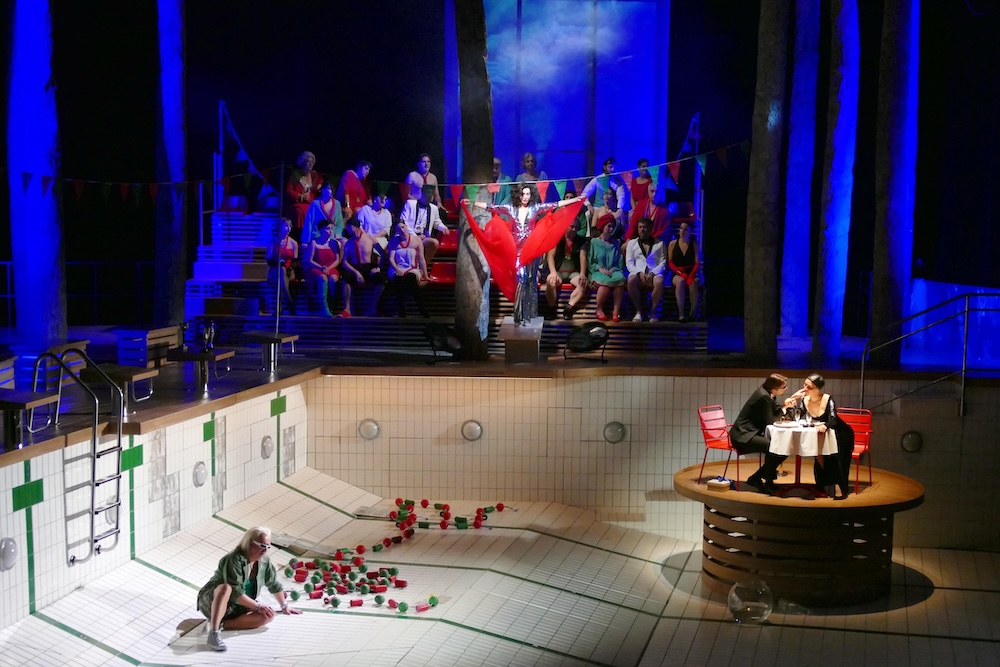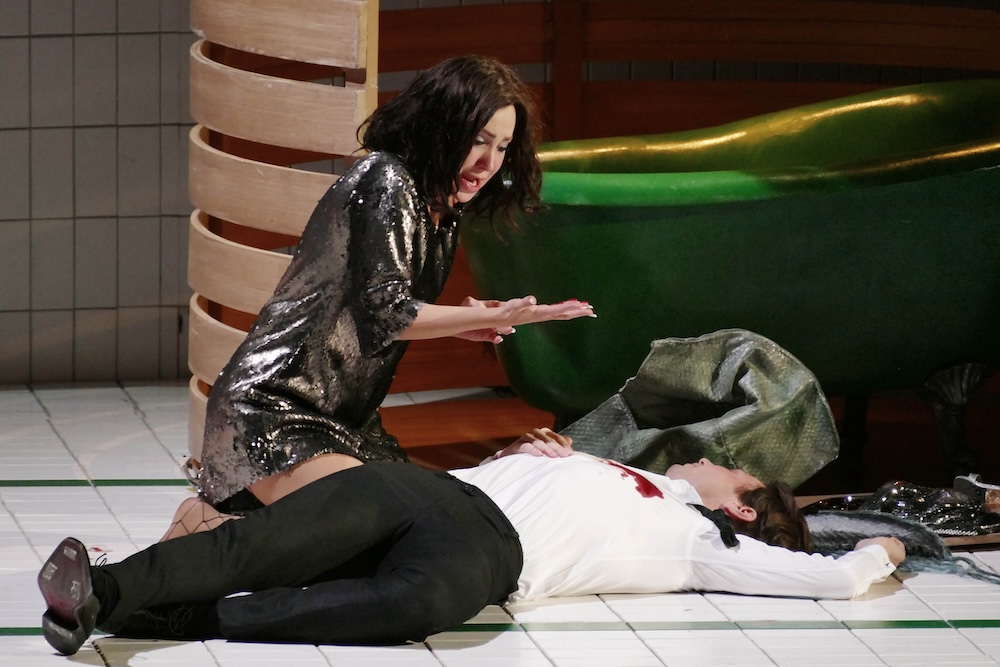It was a fairly straight forward Rusalka, even though it took place at an on-stage Olympic style swimming pool, somewhere. Rusalka did kill the prince with a spear fishing gun, not a kiss, Jezibaba, a janitoress with a broken leg, looked on.
Bordeaux based directing and design duo Jean-Philippe Clarac and Olivier Deloeuil with their collaborators (lighting designers Christophe Pithiest and Rick Martin, video creators Pascal Boudet and Timothée Bruisson, and dramaturg Luc Bourrousse) call themselves “le lab” (the lab). The lab’s multidisciplinary approach seeks to add a social and political environment to whatever surroundings they have chosen to place an opera.
In Marseille just now (though seen already in Bordeaux, Avignon and Nice, yet to come to Toulon) it was the world of water ballet (synchronized, choreographed swimmers), thus explaining the lab’s setting of Dvorak’s 1901 fairy tale opera in a swimming pool — you could almost smell the chlorine. Dvorak’s three water sprites were joined by three dancers to make a troupe of ballerina sprites, who only moved in highly choreographed, team motions. But at the beginning of Act II they were transformed into actual water ballerinas, in an interpolated video recording of a real water ballet performance.

The impression was that these stage directors had never been to an actual opera, explaining why the conductor was denied access to the stage — conductor Lawrence Foster was already in the pit when we (the audience) entered, and remained there through the bows. It is however possible that he simply declined to associate himself with the stage.
Much of the action of the opera took place behind the pool’s diving board, high up and far away from from both the conductor and the audience, with the expected acoustical disadvantage. A further impression was that the stage directors were deaf, explaining the bright white tiles covering the pool, and a sizable portion of the stage picture, blinding our ears to the glories of Dvorak’s hyper colorful orchestration.
As it turns out the political and social world of water ballet, from which the water sprite non-conforming Rusalka had been expelled, is not very interesting. Its politics are obvious and its social life is limited to finding water-proof make up and creating water-proof hair styles. Maybe the witch Jezibaba was a water ballerina until she broke her leg and could no longer swim. Come to think of it, the Rusalka fairy tale isn’t very interesting either, though its libretto offers many great occasions for some songs.
Surprisingly, “le lab” has operatic credits at Brussel’s Monnaie, the Rome Opera, and several known German stages. This trip to the French Riviera seems to have been underwritten by something called Arsud, maybe a bit like the U.S.’s NEA.
Conductor Lawrence Foster is no stranger to bizarre settings for Rusalka, having presided over a 2013 staging in Monaco (a motorcycle and a perpetually water-soaked Vadnik [the spirit of the lake]). The veteran maestro has surely seen it all by now thus explaining his very straight forward, no nonsense approach to the big sounds of the Dvorak score, the Marseille orchestra avoiding the score’s myriad colors, even the beautifully performed harp episodes seemed perfunctory.
Fortunately the cast upheld its end of things with patience and vocal aplomb. Romanian soprano Cristina Pasaroiu sang Rusalka. She possesses a clear, clean voice that well met the role’s considerable demands, above all the unflagging endurance to sustain the big, upper voice, middle European sound for extended periods. It is a purity of voice that has made her Carmen’s Micaela on some of opera’s major stages.

The role of the Prince, sung by French tenor Sébastien Guèze, has the same demands, equally well met by the perpetually youthful Mr. Guèze. With Mme. Pasaroiu, making a handsome couple, he held forth magnificently in the famed, grandiose final duet, though he had noticeable difficulty reconciling his vocal technique to certain Czech sounds. Once a Operalia audience favorite (2006), he will soon sing Hoffman in Lithuania, and last year he was Des Grieux in Auber’s Manon Lescaut in Torino.
The fatherly spirit-of-the-lake Vadnik was engagingly performed by Moscow born and raised, German finished Mischa Schelomianski. Of ample voice and personality he well met the demands of this role that teases a “buffo” attitude with a presumed weighty presence. Mr. Schelomianski was Polkan in the Aix Festival’s The Golden Coq, and Rocco in Avignon’s Fidelio as well as Baron Ochs in its Rosenkavalier.
The forester and the kitchen boy were charmingly performed by Marseille baritone Philippe-Nicholas Martin and Belgian mezzo soprano Coline Dutilleul. They donned white hazmat garb (hazardous material protection) for their encounter with Jezibaba in Act III. The Jezibaba role, normally a character role, was here a straight dramatic role, that of a janitor. It was well sung by French mezzo soprano Marion Lebèque. It was unclear if she was performing with a broken leg, or if the production required her to be handicapped.
The Foreign Princess was very elegantly enacted (vocally and visually) by French soprano Camille Schnoor. The three water sprites were ably sung by Mathilde Lemaire, Marie Kalinine, and Hagar Sharvit. Together with three dancers they comprised a troupe of beautiful girls who exist only in strictly choreographed regimentation. There was no program credit for the primitive choreography.
Michael Milenski
Opéra de Marseille, Marseille, France, February 16, 2025.
All photographs copyright Christian Dresse, courtesy of the Opéra de Marseille